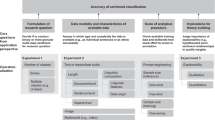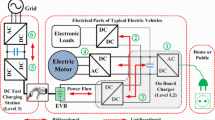Abstract
New energy vehicles (NEVs) have beneficial effects on the energy conservation and environmental protection in the transportation sector. The governments have issued many policies to promote their development and adoption. But, how to evaluate the NEVs is still a noteworthy topic. In this paper, we focus on the evaluation of NEVs through online reviews. First, the online reviews are obtained from the websites by data crawling technology. After obtaining the data, a data-driven based method is developed to extract the attributes about the NEVs and sentiment analysis is conducted to discriminate the sentiment orientation of each review to each alternative under each attribute. Then, we define a new information transformation mechanism to realize the transformation from unstructured data to picture fuzzy numbers. Next, a weight determination method based on the proposed picture fuzzy entropy measure is defined to determine the weight of attributes. Finally, considering the bounded rationality of consumers in purchasing, a picture fuzzy set-based regret theory is proposed to quantify their psychological behavior. A case study about the evaluation of NEVs are presented to show the implementation process of this research. Discussions consisting of comparative analysis and parameter analysis are also conducted to explore the superiority and robustness of the proposed evaluation method.










Similar content being viewed by others
References
Araújo K, Boucher JL, Aphale O (2019) A clean energy assessment of early adopters in electric vehicle and solar photovoltaic technology: geospatial, political and socio-demographic trends in New York. J Clean Prod 216:99–116
Bell DE (1982) Regret in decision making under uncertainty. Oper Res 30:961–981
Bi J, Liu Y, Fan Z (2019a) Representing sentiment analysis results of online reviews using interval type-2 fuzzy numbers and its application to product ranking. Inf Sci 504:293–307
Bi J, Liu Y, Fan Z, Zhang J (2019b) Wisdom of crowds: conducting importance-performance analysis (IPA) through online reviews. Tour Manage 70:460–478
Bleichrodt H, Cillo A, Diecidue E (2010) A quantitative measurement of regret theory. Manage Sci 56:161–175
Bonges HA, Lusk AC (2016) Addressing electric vehicle (EV) sales and range anxiety through parking layout, policy and regulation. Transp Part A Policy Pract 83:63–73
Chen J, Teng L, Liu S, Zhu H (2015) Anticipating regret and consumers’ preferences for counterfeit luxury products. J Bus Res 68:507–515
Chen W, Goh M, Zou Y (2018) Logistics provider selection for omni-channel environment with fuzzy axiomatic design and extended regret theory. Appl Soft Comput 71:353–363
Chen K, Ren C, Gu R, Zhang P (2019) Exploring purchase intentions of new energy vehicles: from the perspective of frugality and the concept of “Mianzi.” J Clean Prod 230:700–708
Chen ZS, Liu XL, Chin KS, Pedrycz W, Tsui KL, Skibniewski MJ (2021) Online-review analysis based large-scale group decision-making for determining passenger demands and evaluating passenger satisfaction: case study of high-speed rail system in China. Information Fusion 69:22–39
Cheng X, Long R, Chen H (2020) A policy utility dislocation model based on prospect theory: a case study of promoting policies with low-carbon lifestyle. Energy Policy 137:111134
Cuong BC (2014) Picture fuzzy sets. J Comput Sci Cybern 30:409–420
Cuong BC, Kreinovich V (2013) Picture fuzzy sets—a new concept for computational intelligence. In: Proceedings of the third world congress on information and communication technologies (WICT’2013), Hanoi, Vietnam, 15–18 December 2013, pp 1–6
Davvetas V, Diamantopoulos A (2017) Regretting your brand-self? The Moderating Role of Consumer-Brand Identification on Consumer Responses to Purchase Regret. J Bus Res 80:218–227
Fan Z, ** Y, Liu Y (2017) Supporting consumer’s purchase decision: a method for ranking products based on online multi-attribute product ratings. Soft Comput 22:5247–5261
Fan Z, Li G, Liu Y (2020) Processes and methods of information fusion for ranking products based on online reviews: an overview. Inf Fusion 60:87–97
Feng J, Xu S, Li M (2021) A novel multi-criteria decision-making method for selecting the site of an electric-vehicle charging station from a sustainable perspective. Sustain Cities Soc 65:102623
Fu Z, Dong P, Ju Y (2020) An intelligent electric vehicle charging system for new energy companies based on consortium blockchain. J Clean Prod 261:121219
Garg H, Wang L (2020) Algorithm for multiple attribute decision-making with interactive Archimedean norm operations under Pythagorean fuzzy uncertainty. Int J Comput Intell Syst 14:503–527
Jana C, Senapati T, Pal M, Yager RR (2019) Picture fuzzy Dombi aggregation operators: application to MADM process. Appl Soft Comput 74:99–109
Ju Y, Ju D, Santibanez Gonzalez EDR, Giannakis M, Wang A (2019) Study of site selection of electric vehicle charging station based on extended GRP method under picture fuzzy environment. Comput Ind Eng 135:1271–1285
Jung Y, Suh Y (2019) Mining the voice of employees: a text mining approach to identifying and analyzing job satisfaction factors from online employee reviews. Decis Support Syst 123:113074
Khan H, Daryanto A, Liu C (2019) How anticipated regret influences the effect of economic animosity on consumers’ reactions towards a foreign product. Int Bus Rev 28:405–414
Li W, Long R, Chen H (2016) Consumers’ evaluation of national new energy vehicle policy in China: an analysis based on a four paradigm model. Energy Policy 99:33–41
Liang D, Dai Z, Wang M (2020) Assessing customer satisfaction of O2O takeaway based on online reviews by integrating fuzzy comprehensive evaluation with AHP and probabilistic linguistic term sets. Appl Soft Comput 94:106847
Liao C, Lin HN, Luo MM, Chea S (2017) Factors influencing online shoppers’ repurchase intentions: the roles of satisfaction and regret. Inf Manag 54:651–668
Liu P, Teng F (2019) Probabilistic linguistic TODIM method for selecting products through online product reviews. Inf Sci 485:441–455
Liu Y, Bi J, Fan Z (2017) Ranking products through online reviews: a method based on sentiment analysis technique and intuitionistic fuzzy set theory. Inf Fusion 36:149–161
Liu P, Shen M, Teng F, Zhu B, Rong L, Geng Y (2021) Double hierarchy hesitant fuzzy linguistic entropy-based TODIM approach using evidential theory. Inf Sci 547:223–243
Loomes G, Sugden R (1982) Regret theory: an alternative theory of rational choice under uncertainty. Econ J 92:805–824
Luo M, Zhang Y (2020) A new similarity measure between picture fuzzy sets and its application. Eng Appl Artif Intell 96:103956
Mcshane BB, Bradlow ET, Berger J (2012) Visual influence and social groups. J Mark Res XLIX:854–871
Michenaud S, Solnik B (2008) Applying regret theory to investment choices: currency hedging decisions. J Int Money Financ 27:677–694
Newman D, Chemudugunta C, Smyth P (2006) Statistical entity-topic models. In: Proceedings of the 12th ACM SIGKDD international conference on knowledge discovery and data mining, pp 680–686
Nie R, Tian Z, Wang J, Chin KS (2020) Hotel selection driven by online textual reviews: applying a semantic partitioned sentiment dictionary and evidence theory. Int J Hosp Manag 88:102495
Pan X, Wang Y, Chin K-S (2021) Dynamic programming algorithm-based picture fuzzy clustering approach and its application to the large-scale group decision-making problem. Comput Ind Eng 157:107330
Peng X, Dai J (2017) Approaches to Pythagorean fuzzy stochastic multi-criteria decision making based on prospect theory and regret theory with new distance measure and score function. Int J Intell Syst 32:1187–1214
Peng X, Yang Y (2017) Algorithms for interval-valued fuzzy soft sets in stochastic multi-criteria decision making based on regret theory and prospect theory with combined weight. Appl Soft Comput 54:415–430
Peng H, Shen K, He S, Zhang H, Wang J (2019) Investment risk evaluation for new energy resources: an integrated decision support model based on regret theory and ELECTRE III. Energy Convers Manage 183:332–348
Quiggin J (1994) Regret theory with general choice sets. J Risk Uncertain 8:153–165
Simon HA (1947) Effects of increased productivity upon the ratio of urban to rural population. Econometrica 15:31–42
Skelton ACH, Allwood JM (2017) Questioning demand: a study of regretted purchases in Great Britain. Ecol Econ 131:499–509
Song IY, Zhu YJ (2016) Big data and data science: what should we teach? Expert Syst 33:364–373
Sun X, Han M, Feng J (2019) Helpfulness of online reviews: examining review informativeness and classification thresholds by search products and experience products. Decis Support Syst 124:113099
Tran LTT (2020) Online reviews and purchase intention: a cosmopolitanism perspective. Tour Manag Perspect 35:100722
Tsai CF, Chen K, Hu YH, Chen WK (2020) Improving text summarization of online hotel reviews with review helpfulness and sentiment. Tour Manage 80:104122
Wang Z, Zhao C, Yin J, Zhang B (2017) Purchasing intentions of Chinese citizens on new energy vehicles: how should one respond to current preferential policy? J Clean Prod 161:1000–1010
Wang L, Peng J, Wang J (2018) A multi-criteria decision-making framework for risk ranking of energy performance contracting project under picture fuzzy environment. J Clean Prod 191:105–118
Wang R, Li X, Xu C, Li F (2020a) Study on location decision framework of electric vehicle battery swap** station using a hybrid MCDM method. Sustain Cities Soc 61:102149
Wang H, Pan X, Yan J, Yao J, He S (2020b) A projection-based regret theory method for multi-attribute decision making under interval type-2 fuzzy sets environment. Inf Sci 512:108–122
Wang W, Tian G, Zhang T, Jabarullah NH, Li F, Fathollahi-Fard AM, Wang D, Li Z (2020c) Scheme selection of design for disassembly (DFD) based on sustainability: a novel hybrid of interval 2-tuple linguistic intuitionistic fuzzy numbers and regret theory. J Clean Prod. https://doi.org/10.1016/j.jclepro.2020.124724
Wu Y, Gu F, Ji Y, Guo J, Fan Y (2020) Technological capability, eco-innovation performance, and cooperative R&D strategy in new energy vehicle industry: evidence from listed companies in China. J Clean Prod 261:121157
**ong Y, Wang L (2020) Policy cognition of potential consumers of new energy vehicles and its sensitivity to purchase willingness. J Clean Prod 261:121032
Xu J, Zhong L, Yao L, Wu Z (2018) An interval type-2 fuzzy analysis towards electric vehicle charging station allocation from a sustainable perspective. Sustain Cities Soc 40:335–351
Yi T, Zhang C, Lin T, Liu J (2020) Research on the spatial-temporal distribution of electric vehicle charging load demand: a case study in China. J Clean Prod 242:118457
Yue C (2020) Picture fuzzy normalized projection and extended VIKOR approach to software reliability assessment. Appl Soft Comput 88:106056
Zhang S, Zhu J, Liu X, Chen Y (2016) Regret theory-based group decision-making with multidimensional preference and incomplete weight information. Inf Fusion 31:1–13
Zhang C, Zhao M, Cai M, **ao Q (2020) Multi-stage multi-attribute decision making method based on online reviews for hotel selection considering the aspirations with different development speeds. Comput Ind Eng 143:106421
Zheng Y, Shao Z, Zhang Y, Jian L (2020) A systematic methodology for mid-and-long term electric vehicle charging load forecasting: the case study of Shenzhen, China. Sustain Cities Soc 56:102084
Zuo W, Li Y, Wang Y (2019) Research on the optimization of new energy vehicle industry research and development subsidy about generic technology based on the three-way decisions. J Clean Prod 212:46–55
Acknowledgements
This research was supported by the National Natural Science Foundation of China (Grant No. 61773123). In addition, we thank Professor Luis Martinez for his support with the revising paper.
Author information
Authors and Affiliations
Corresponding author
Additional information
Publisher's Note
Springer Nature remains neutral with regard to jurisdictional claims in published maps and institutional affiliations.
Rights and permissions
About this article
Cite this article
He, S., Wang, Y. Evaluating new energy vehicles by picture fuzzy sets based on sentiment analysis from online reviews. Artif Intell Rev 56, 2171–2192 (2023). https://doi.org/10.1007/s10462-022-10217-1
Accepted:
Published:
Issue Date:
DOI: https://doi.org/10.1007/s10462-022-10217-1




